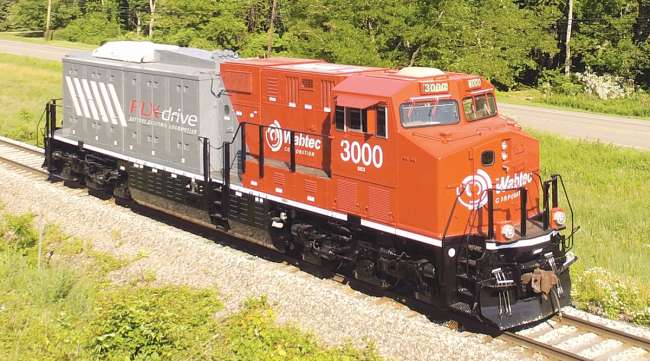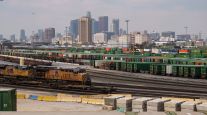Pittsburgh Post-Gazette
Wabtec Denies Charges of Anticompetitive Behavior

[Stay on top of transportation news: Get TTNews in your inbox.]
Progress Rail, a division of Caterpillar Inc., has accused Wabtec Corp. of violating antitrust laws and contractual agreements after acquiring GE Transportation in 2019 — an $11 billion deal that made the Pennsylvania-based rail firm the industry’s largest supplier of certain locomotives and technologies.
Indiana-based Progress, which voiced concerns about the merger in 2019, said its fears have been realized.
“Wabtec, a conceded monopolist, is one of the only or leading manufacturers of a long list of equipment used in the U.S. freight rail network,” Progress wrote in a complaint filed Sept. 6 in the U.S. District Court for the District of Delaware. It said Wabtec uses this position to foreclose opportunities for Progress and that the lack of competition in these areas of the rail sector leads to higher prices for customers and less innovation.
Using the kind of metrics that Wabtec would typically boast about to investors — sometimes pulled directly from company investor presentations — Progress laid out Wabtec’s market share across various products.
- About three out of every four diesel longhaul freight locomotives active in North America were made by Wabtec.
- About 90% of new longhaul freight locomotives that comply with the most recent air emission standards set by the federal government are made by Wabtec.
- It has the vast majority of the market share for inside-the-cab features like power systems; train protection software that helps prevent collisions; and energy management systems, which regulate train speed and operation to make trips more fuel efficient.
According to Progress, the 2019 deal “merged the sole supplier of certain key freight locomotive inputs (Wabtec) with the dominant supplier of finished freight locomotives and other cab technologies (GE Transportation). It created a vertically integrated entity with dominant positions in multiple products and the incentive and ability to engage in anticompetitive exclusionary conduct to harm the competitive process and consumers.”
The solution that Progress proposed in its complaint is for Wabtec to sell what used to be GE Transportation.

Transport Topics' Seth Clevenger, Michael Freeze and Mike Senatore dissect the new Top 100 list of the largest private carriers, including how fleets are adapting to this softened market. Tune in above or by going to RoadSigns.ttnews.com.
Wabtec responded with a brief statement Sept. 11, saying the lawsuit “at its core is an unsupported attack on the merger of Wabtec and GE Transportation, which was completed over four years ago.”
“The merger has provided benefits to the entire industry, as well as Progress Rail itself,” Wabtec claimed, referencing agreements that Wabtec and Progress signed in 2019 and 2020 to ensure Wabtec-based locomotives and software remain compatible with Progress products.
The lawsuit claims Wabtec is not honoring those contracts, a notion Wabtec denied Sept. 11.
“We also firmly believe that Progress Rail’s assertions that Wabtec breached agreements or engaged in other illegal conduct are wrong. We intend to aggressively defend the case in court.”
Progress also quoted Wabtec Chief Financial Officer John Olin making comments at an industry conference in May that suggested Progress is getting out of the business of making new diesel locomotives that would meet federal emission requirements, or Tier IV locomotives, and that it “‘would not be an option for a customer’ for ‘anything that’s new in the United States from here on out.’”
“Such knowingly false public statements directly harm competition and improperly strengthen Wabtec’s existing monopoly over Tier IV locomotives because they intentionally mislead countless existing and potential customers to believe that Progress Rail has left or will soon leave the market, and Wabtec is their only choice,” the lawsuit states.
“Wabtec’s statements were each clearly false. Progress Rail continues to offer and market Tier IV longhaul locomotives, including on its website,” the lawsuit states.
Caterpillar telegraphed a change in its long-term plans for locomotives in January, when it revealed a $925 million impairment on its rail business.

Umpleby
“We believe opportunities exist for new locomotives, overhauls, repowers, and modernizations — but at lower levels than previously forecasted and occurring over a longer time horizon,” James Umpleby, Caterpillar’s CEO, told analysts during an earnings call in January.
Specifically referencing the longhaul freight diesel locomotives, Umpleby said Caterpillar “will continue to offer Tier IV solutions to our customers. However, strategic investments in new locomotive products will continue shifting to competitive, sustainable solutions that help customers meet their carbon reduction initiatives, including hybrid, full battery electric and alternative fuel power sources, including hydrogen.”
Positive Train Control
One area in which Wabtec has near complete control of the market is positive train control, a federally mandated train protection system designed to automatically stop a train to avoid collisions, derailments and other hazards. This includes technology both inside the cab and wayside and requires that any train on any track, regardless of who manufactured or owns the asset, have PTC systems that communicate with the rest of the train’s systems.
Wabtec’s PTC system is ubiquitous across the industry in North America, even on non-Wabtec locomotives. Other software systems, such as those used to optimize fuel efficiency, are also made by other suppliers. All these systems need to talk to each other for the locomotive to function properly. Because Wabtec controls at least one component on board, others like Progress Rail rely on it to make it accessible.
In its complaint, Progress accused Wabtec of limiting its access to software updates and communication protocols needed for Wabtec-designed systems to interact with those made by other suppliers.
“Wabtec causes unnecessary operational issues on Progress Rail’s locomotives that frustrate customers, lead to customer dissatisfaction, and cause customers not to buy Progress Rail locomotives,” the company said in the lawsuit. “Such frustration and dissatisfaction also has caused customers to store Progress Rail’s locomotives first, which ultimately limits revenue from maintenance, service parts, and other aftermarket support in the rail industry.”
Progress blamed Wabtec for the delayed release of its own energy management system. It also said that if it weren’t for Wabtec’s anticompetitive conduct, Progress would have “substantially” more revenue and profits.
Want more news? Listen to today's daily briefing below or go here for more info:
Distributed by Tribune Content Agency, LLC




